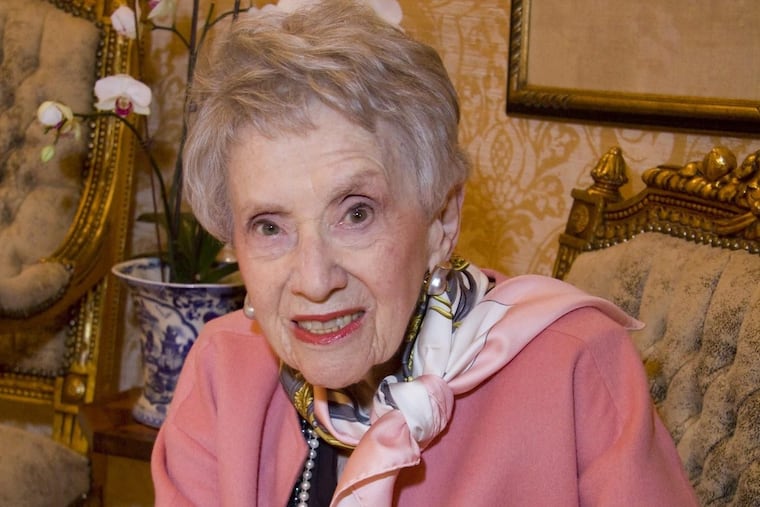Frieda Lefeber, 103, Holocaust survivor, nurse and painter
Fifteen of her family members died in the Holocaust, but Mrs. Lefeber wasn't bitter. "I can't hate people, even if they hurt me. I am not made that way," she said.

Frieda Lefeber, 103, of Wynnewood, a Holocaust survivor, registered nurse, and painter who attributed her long life to staying active, died Monday, Nov. 5, at her daughter's home in Penn Valley.
Mrs. Lefeber was born in 1915 to a Jewish family in Wissek, a city now in Poland that was then part of Germany. She was training at the Nursing School in the Jewish Hospital of Berlin when world events intervened.
In November 1938, a 23-year-old Frieda Graumann witnessed Germany's Kristallnacht – the night of broken glass — when the Nazis vandalized Jewish shops, homes and schools, burned synagogues, and murdered nearly 100 Jews.
"They beat the people up on the street, and we got them" in the hospital," she said in 1996. Uninjured Jews were hidden there. They were told to "lie down and don't move" so they would not be taken to concentration camps.
She immigrated to the United States on a working visa in April 1939.
"I was one of the last nurses to get out of Germany," she said. "All I had was my little valise and $4."
She worked as a nurse in New York before joining the Coast Guard in 1946. Deployed as a nurse on a minesweeper in the Mediterranean Sea, she was reunited with what was left of her family who had fled Europe for what was then Palestine.
The meeting was bittersweet. She had lost 15 close relatives in the Holocaust. Despite that, she remained positive.
"I keep busy every hour of the day," she once told a TV interviewer. "I don't baby myself. I think it's foolish."
She attributed her positive attitude to staying so active that she wouldn't have time to think bad thoughts.
In 1948, she married Hans Lefeber, her boyfriend from prewar Germany. The couple moved to New York and then Morristown, in North Jersey. They had a daughter. For the next three decades, she worked as an electrologist with businesses in New York, Morristown, and Philadelphia. She commuted to Philadelphia on weekends starting in 1986 and moved here in 1991.
That same year, Mrs. Lefeber decided to learn painting. She began art classes at Rosemont College at age 76 and earned a certificate from the Pennsylvania Academy of the Fine Arts in 1998 at age 83. She took classes at the Barnes Foundation and enrolled for a time in the Ecole des Beaux-Arts in Paris.
Her portfolio contains over 300 works of art, mostly oil paintings, which she debuted in a solo art show at age 100 at Rosemont College. Some were landscapes painted while abroad. She won the 1998 Arco Chemical Purchase Prize and the Mable Woodrow Wilson Award.
In 2001, she began writing, which she found therapeutic. In October 2003, Frieda's Journey was published by Xlibris Corp.
"Writing this book has given me a better understanding of how things happen to you and how your overcome your challenges," she told the Morristown Daily Record in 2004.
Mrs. Lefeber educated the public about the Holocaust. She spoke at places of worship and universities and offered herself as an example of someone who had forgiven her persecutors.
According to family, when asked about losing her relatives in the Holocaust, she said: "I have never been resentful, I can't hate people, even if they hurt me. I am not made that way."
"She advocated for a culture of education and acceptance, believing that knowledge of other religions could diminish the hatred that she witnessed," her family said.
Mrs. Lefeber's 2014 oral history, on file at the U.S. Holocaust Memorial Museum, can be heard at https://collections.ushmm.org/search/catalog/irn84822.
Later, Mrs. Lefeber learned Hebrew and studied the Torah. She was a member of Main Line Reform Synagogue, Congregation Rodeph Shalom, and Har Zion Synagogue.
She was a member of the International Women's Club and donated generously to ORT, a nonprofit that fosters education and Hadassah.
She enjoyed attending the Walnut Street Theatre and visiting the Philadelphia Museum of Art.
Mrs. Lefeber's husband died in 1975. She is survived by a daughter, Hope; two grandchildren; and two great-grandchildren.
Funeral services were Wednesday, Nov. 7.
Contributions may be made to the U.S. Holocaust Museum at https://donate.ushmm.org/6hRw6kqugUOvJLNKCIbD1g2 or the Main Line Home Care & Hospice Foundation at https://www.mainlinehealth.org/ways-to-give/homecare-and-hospice-foundation